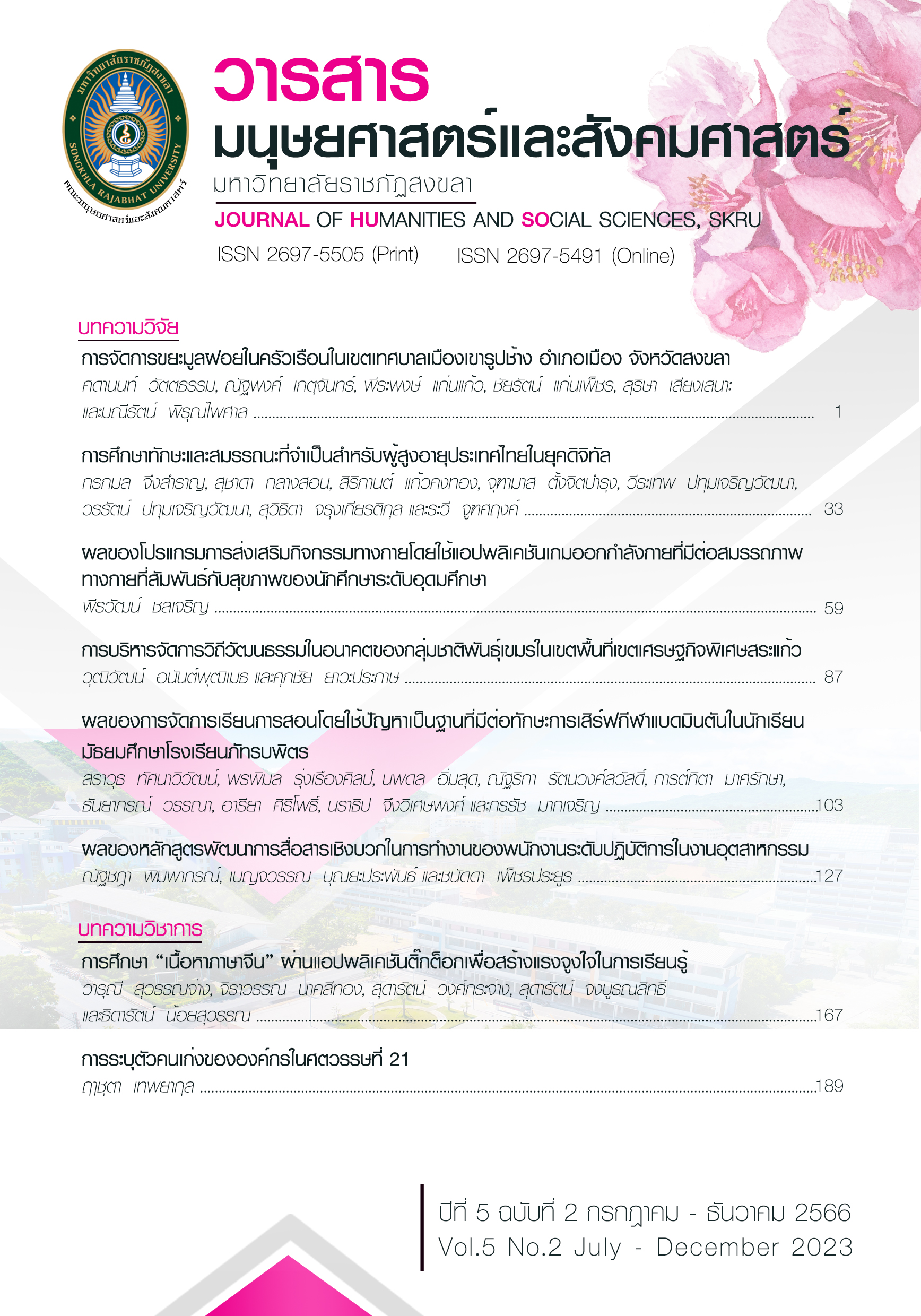TALENT IDENTIFICATION OF ORGANIZATION IN THE TWENTY-FIRST CENTURY
Main Article Content
Abstract
Talent management is a significant human resource management strategy in the 21st century with talent identification is the first element of talent management. Although there is literature that presents about talent management, there are only a few pieces of literature that directly presents about talent identification. Also, the knowledge gap regarding both the meaning and criteria of talent identification are still unclear. This paper aimed to present important knowledge about the meaning and criteria of talent identification based on the related literature review.
Organizational executives, human resource management officers, and related officers can apply this knowledge to benefit the development of talent management and human resource management to achieve the goals of the organization and increase the performance of the organization in the 21st century.
Downloads
Article Details

This work is licensed under a Creative Commons Attribution-NonCommercial-NoDerivatives 4.0 International License.
ลิขสิทธิ
References
ฤๅชุตา เทพยากุล และอิศรัฏฐ์ รินไธสง. (2559). “ความหมายและองค์ประกอบของการบริหารคนเก่งในองค์กร: การทบทวนวรรณกรรม.” วารสารเทคโนโลยีภาคใต้, 9(2), 77–84.
Calle-Duran, M. C., Fernandez-Alles, M. L., & Valle-Cabrera, R. (2021). “Talent identification and location: A configurational approach to talent pools.” Intangible Capital, 17(1), 17-32. Retrieved July 9, 2023, from https://doi.org/10.3926/ic.1440
Dries, N. (2013). “The psychology of talent management: A review and research agenda.” Human Resource Management Review. 23(1), 272–285. Retrieved July 9, 2023, from http://doi.org/10.1016/j.hrmr.2013.05.001
França, T. J. F., Mamede, H. S., Barroso, J. M. P., & Santos, V. M. P. D. (2023). “Artificial intelligence applied to potential assessment and talent identification in an organisational context.” Heliyon, 9(1), 1–25. Retrieved July 9, 2023, from https://doi.org/10.1016/j.heliyon.2023.e14694
He, Z. (2022). Employee outcomes of talent identification and development. Master of Science in Economics and Business Administration, University of VAASA School of Management. Retrieved July 9, 2023, from https://www.osuva.uwasa.fi/bitstream/handle/10024/13947/UniVaasa_2022_Zixin_He.pdf?sequence=2&isAllowed=y
Ibrahim, H. I., Isa, A., Halim, J., & Jaafar, A. H. (2019). Talent identification, perceived organizational support and employee engagement: Evidence from Malaysian GLCS. European Proceedings of Social and Behavioural Sciences, AAMC 2019 The 13th Asian Academy of Management International Conference 2019, 873–881. Retrieved July 9, 2023, from https://www.europeanproceedings.com/article/10.15405/epsbs.2020.10.79.
Kelly, A. L., Calvo, A. L., Santos, S. D. L., & Sáiz, S. L. J. (2022). Special issue “Talent identification and development in youth sports”. Sports, 10(12), 1–6. Retrieved September 18, 2023, from https://doi.org/10.3390/sports10120189
Lekiqi, B., Loku, A., & Neziraj, E. (2022). “The talent management and strategic perspectives of their preoccupation and commitment in high research institutions.” WSEAS Transactions on Environment and Development. 18(1), 1158–1173. Retrieved September 18, 2023, from https://doi.org/10.37394/232015.2022.18.110
Lokhande, J. S. (2023). “Talent management and its impact on organization performance: A conceptual framework”. Journal of Emerging Technologies and Innovative Research, 10(2), 823–825.
Marhuri, S., & Karneli, O. (2023). “The effect of talent management on employee performance with self-efficacy as mediation variables”. Almana: Jurnal Manajemen dan Bisnis, 7(1), 39–48. Retrieved September 18, 2023, from https://doi.org/10.36555/almana.v7i1.2076
McDonnell, A., Skuzaszka, A., Jooss, S., & Scullion, H. (2021). “Tensions in talent identification: A multi-stakeholder perspective.” The International Journal of Human Resource Management, 34(1), 1–30. Retrieved July 9, 2023, from https://doi.org/10.1080/09585192.2021.1976245
Nijs, S., Dries, N., Vlasselaer, V. V., & Sels, L. (2021). “Reframing talent identification as a status‐organising process: Examining talent hierarchies through data mining.” Human Resource Management Journal, 32(1), 169–193. Retrieved September 7, 2023, from https://doi.org/10.1111/1748-8583.12401
Parra-Martinez, F. A., & Wai, J. (2023). “Talent identification research: A bibliometric study from multidisciplinary and global perspectives.” Frontiers in Psychology, 14(1), 1–22. Retrieved September 7, 2023, from https://doi.org/10.3389/fpsyg.2023.1141159
Piansoongnern, O., Anurit, P., & Kuiyawattananonta, S. (2011). “Talent management in Thai cement companies: A study of strategies and factors influencing employee engagement.” African Journal of Business, 5(5), 1578–1583. Retrieved September 18, 2023, from https://doi.org/10.5897/AJBM10.022
Vardi, S. & Collings, D. G. (2023). “What's in a name? talent: A review and research agenda.” Human Resource Management Journal, 1-23. Retrieved September 7, 2023, from https://doi.org/10.1111/1748-8583.12500
Zhang, Y. (2017). Talent management implementation within organizational context. Master of Science Thesis, KTH Industrial Engineering and Management, Industrial Management, Stockholm. Retrieved 9 July, 2023, from https://www.diva-portal.org/smash/get/diva2:1234352/FULLTEXT01.pdf


